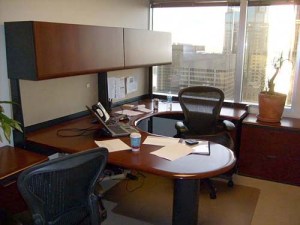I was recently introduced to Gensler’s magazine “Dialogue.” If you are into commercial real estate issues like workplace and architecture it is a must read with great pictures of Gensler’s recent projects. In issue #22 there are some interesting thoughts on private offices vs. open plan in an article called “Stressed out by Openess”. Check out page 28 for the interview of Susan Cain, author of “Quiet.” She discusses how introverts have a harder time in open plan environments. I have opined on this issue before (see my blog “Workplace and Innovation“) and believe that like the stock market reaching its apex, all frenzies ultimately lose their froth. Or at least that’s my hope, because I prefer a private office!
I am not alone with Ms. Cain regarding the caution that must be applied to designing too much open space. Not everybody thrives in an open area. It can be noisy and distracting even for an extrovert. With no office door to close, interruptions are difficult avoid. Most everyone in the workplace needs to focus on the task at hand at some point during the day. Quiet and privacy help that happen. Without it I argue that productivity can be adversely affected. Add to that the confidential nature of certain businesses or assignments that can be violated. Dare I say that an open environment risks confidential conversations being eavesdropped upon, and may even expose companies that overuse “bullpens” to legal exposure for not properly protecting confidential information?
Let’s be honest, open space and cubicle farms have been around forever. It’s more about efficiency and cost savings measured by metrics like “square foot per employee” and “Office space utilization rate” that drive open plan, benching, “address-free” offices and to some extent “creative” space. I am not trying to knock “creative” or open space at all (See my next post on CBRE’s new Amsterdam office), and I think in many instances it is the perfect solution for the right type of employer. But companies must be careful to provide the right type of space for their employees based on the type of work they perform, how they are compensated, and the type of people they are.


